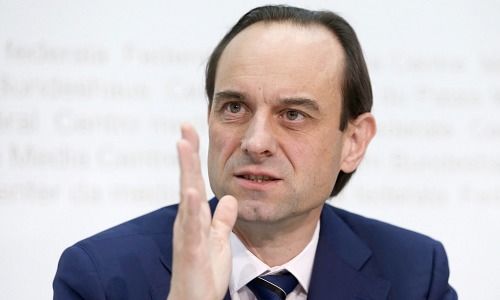Switzerland has been overrun by cryptocurrency start-ups. Finma CEO Mark Branson told finews.com he doesn't want to write digital token firms a blank check, but is trusting in Swiss principles.
Mark Branson, you described innovation as existential for the finance industry. Several crypto banks in Switzerland are in the starting blocks. Can they count on the regulator rushing through a rubber-stamp of their licenses?
We will strictly maintain our principle of neutrality. Everyone should have the same opportunity – regardless whether they want to found a traditional or a crypto bank. The rules are the same for everyone.
You hinted that Finma now spends most of its time reviewing new digital currencies. Is if Finma's role in the current ICO hype to play the spoilsport?
It's the regulator's role to a certain degree to show where the boundaries are. But there are certainly many serious providers in this field who want to do business in full compliance with the law. We recently published ICO guidelines for those people.
Finma is accused regulatory frenzy by lawmakers. Are you intentionally liberal with fintechs in order to weaken those accusations?
Our approach shouldn't be seen as political one. Instead, our strategic goals are based on providing equal opportunities for existing as well as new business models.
«Complaints are necessarily a bad thing»
It is true that certain adjustments were necessary so that regulation doesn't discriminate against innovation. One example is the physical presence to identify clients, which we eased for digital models.
Finma is quite ruthless in the handing out banker bans: last year, you handed out double the sanctions of 2016. But complaints against you have also risen. Do you fear losing your most effective weapon?
A complaint isn't per so a bad thing. Professional bans as sanctions are relatively new, and haven't yet been treated in court. A certain intensity in the complaints pipeline was to be expected. Court decisions – favorable or unfavorable – will help up calibrate the sanctions more precisely.
But Finma conspicuously chose the approach of holding individuals accountable. You're sanguine about the wave of complaints against you?
We have to understand that professional banks hit hard for individuals affected by them. The incentive to put up a fight are greater than with a firm, which may simply elect to draw a line under the affair. We are convinced that banker bans are an effective measure because they also act as a deterrent.
Mark Branson has been head of Swiss financial regulator Finma since 2014. Previously, he worked for UBS for 12 years, including a stint as head of Japan and a finance role in the Swiss bank's U.S. wealth arm. In 2008, the British-Swiss banker became the public face of UBS' tax battle with U.S. authorities after he apologized to a Senate subcommittee for the Swiss bank's offshore dealings with wealthy Americans.
The 49-year-old is a graduate of Cambridge and worked for Credit Suisse before joining UBS. Since moving to Finma eight years ago, the Swiss agency had become a toothier enforcer, often singling out bankers in a naming-and-shaming approach. Branson is part of a group advising the Swiss government on how to handle the dozens of initial coin offerings and cryptocurrency providers which have chosen Switzerland as their home base.




































